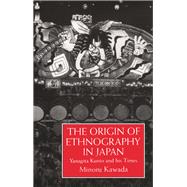Origin Of Ethnography In Japan
, by Kawada- ISBN: 9780710304506 | 0710304501
- Cover: Nonspecific Binding
- Copyright: 1/8/1993
The many changes that have taken place in Japan as a result of the period of rapid economic growth - including the imbalance in development of primary and secondary industry; the tremendous expansion of heavy industry accompanied by the gradual decay of agriculture; the failure to establish a healthy productivity cycle; the destruction of the natural environment and traditional patterns of life and especially the emergence and rapid growth of social apathy due to the lack of a firmly-established base on which to build the burgeoning supra-modern 'popular society' - have renewed interest in the work of Yanagita Kunio (1872-1962), generally known as the founder of ethnography in Japan.
Yanagita consistently expressed his concern about the effects of Japan's hasty modernization on the lives and values of its ordinary citizens. Critical of the Meiji establishment's policies for their short-term perspective on Japan's economic success in the international arena, Yanagita maintained an independent position and, through his work, attempted to overcome the problems caused by the direct importation of European ideas into Japan by isolating, recording and analysing the unique features of Japanese life, using them to present an alternative modernization theory which incorporated a fundamental restructuring of Japan's domestic economy and its social system. To Yanagita, the significance of ethnography lay in the way it could reconstruct the indigenous values of the past. His contention was that an understanding of indigenous cultural values and a revitalization of the traditional communal spirit were essential to the establishment of a moral foundation for Japanese society in the years of great change between the Meiji, Taisho and Showa eras and, by extension, to Japan today.
The Origin of Ethnography in Japan presents a timely re-evaluation of the writings of Yanagita Kunio. Chapter One examines his early writings on agro-politics, Chapter Two discusses the background to Yanagita's interest in ethnographic studies with reference to his work on Japan's folk religion and Chapter Three demonstrates how Yanagita's theory of agro-politics was combined with his interest in cultural studies, leading him to explore a broader theory of social development. Chapter Four summarizes Yanagita's views on some of the major political issues of his time, while Chapter Five concentrates on the methodology known as 'Yanagita Ethnography' and compares Yanagita's method and research aims with those of the anthropologist Bronislaw Malinowski. Lastly, Chapter Six deals with Yanagita's idea of communality, which he believed to be central to the understanding of human relationships and social structure in traditional Japan, and his view that communality could be utilized to bring people together at the family, village and national levels in contemporary Japan.
Yanagita consistently expressed his concern about the effects of Japan's hasty modernization on the lives and values of its ordinary citizens. Critical of the Meiji establishment's policies for their short-term perspective on Japan's economic success in the international arena, Yanagita maintained an independent position and, through his work, attempted to overcome the problems caused by the direct importation of European ideas into Japan by isolating, recording and analysing the unique features of Japanese life, using them to present an alternative modernization theory which incorporated a fundamental restructuring of Japan's domestic economy and its social system. To Yanagita, the significance of ethnography lay in the way it could reconstruct the indigenous values of the past. His contention was that an understanding of indigenous cultural values and a revitalization of the traditional communal spirit were essential to the establishment of a moral foundation for Japanese society in the years of great change between the Meiji, Taisho and Showa eras and, by extension, to Japan today.
The Origin of Ethnography in Japan presents a timely re-evaluation of the writings of Yanagita Kunio. Chapter One examines his early writings on agro-politics, Chapter Two discusses the background to Yanagita's interest in ethnographic studies with reference to his work on Japan's folk religion and Chapter Three demonstrates how Yanagita's theory of agro-politics was combined with his interest in cultural studies, leading him to explore a broader theory of social development. Chapter Four summarizes Yanagita's views on some of the major political issues of his time, while Chapter Five concentrates on the methodology known as 'Yanagita Ethnography' and compares Yanagita's method and research aims with those of the anthropologist Bronislaw Malinowski. Lastly, Chapter Six deals with Yanagita's idea of communality, which he believed to be central to the understanding of human relationships and social structure in traditional Japan, and his view that communality could be utilized to bring people together at the family, village and national levels in contemporary Japan.







